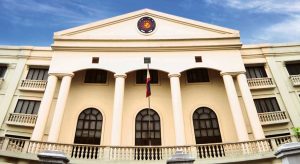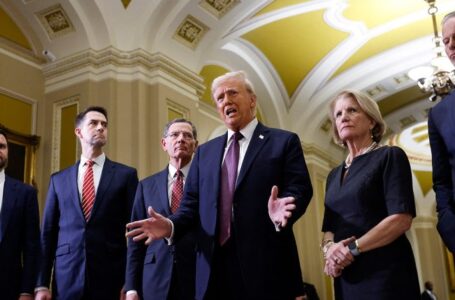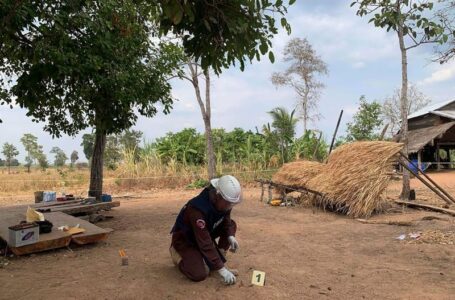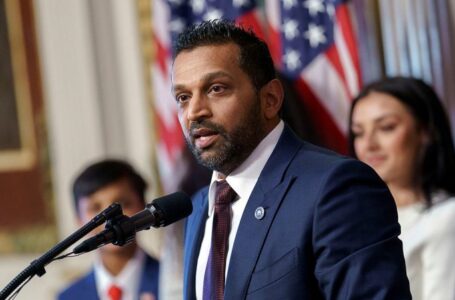Following key wins, Trump poised for cabinet completion in record time
Utilization remains sticking point in infra-heavy budget


By Luisa Maria Jacinta C. Jocson, Reporter
THE National Government (NG) still needs to ensure efficient utilization of the budget as it redirects spending to infrastructure and social services, analysts said.
“The 2024 budget in the Philippines has placed emphasis on both the social sector and infrastructure development. This prioritization aims to enhance the capabilities of the Filipino workforce and provide the necessary capital for sustainable growth,” China Banking Corp. Chief Economist Domini S. Velasquez said in a Viber message.
“However, a key concern lies in the efficient utilization of the budget by government agencies, ensuring timely implementation and minimizing leakages,” she added.
President Ferdinand R. Marcos, Jr. last week signed the national budget for 2024. The P5.768-trillion budget is 9.5% higher than this year’s spending plan and is equivalent to 21.7% of gross domestic product (GDP).
The President said in a speech that the budget will serve as the government’s “battle plan” to reduce poverty, end hunger, and create jobs, among others.
Mr. Marcos also called for the expedited handling of the funds by minimizing red tape and other bureaucratic bottlenecks.
“Implementation delay and illegal deviations inflict the same havoc of denying the people the progress and development that they deserve,” he added.
GDP in the second quarter grew by a weaker-than-expected 4.3%, mainly due to the 7.1% contraction in government spending.
Government agencies were flagged for the slow implementation of projects in the first half. This prompted the NG to order agencies to come up with a “catch-up plan” for spending.
Filomeno S. Sta. Ana III, coordinator of the Action for Economic Reforms, said that sluggish budget utilization was partly due to low absorptive capacity of local government units (LGUs) due to their increased share of national tax allotments after devolution.
“The usual ways of addressing this, like capacity building and the improvement of administrative and fiscal management processes are necessary but evidently not enough,” Mr. Sta. Ana said via Messenger chat.
“The increase in resources for LGUs has likewise been accompanied by a devolution of more services. Such a situation overwhelms many LGUs,” he added.
However, Mr. Sta. Ana noted that underspending is still a problem even at the national level.
“This might suggest that national leadership is unfocused, which is also manifested in other areas. Coordination is weak, and decisiveness is wanting, also manifested in other governance areas,” he said.
“I also suspect that the National Government has deliberately slowed down spending to narrow the fiscal deficit. Look, the administration has yet to pass a significant tax revenue measure; in lieu of that, it slows down spending to make the fiscal picture less ugly,” he added.
The budget deficit contracted 65.27% to P99.1 billion in October as revenue growth surged 33.56%, outpacing government expenditure growth of 8.32%.
To mitigate slow utilization, Ms. Velasquez said it will be crucial to prioritize shovel-ready infrastructure projects.
“By focusing on projects that are prepared and ready for immediate implementation, delays can be minimized, allowing for timely completion and delivery of much-needed infrastructure,” she said.
“This approach can help accelerate economic development and improve the quality of public services,” she added.
The government is seeking to finance 197 infrastructure flagship projects with an indicative total cost of P8.7 trillion.
Ms. Velasquez recommended the stronger implementation of cash-based budgeting to improve utilization.
“This approach requires agencies to spend their allocated budget within the fiscal year, promoting accountability and preventing underspending. By enforcing stricter budget execution, the government can optimize resource allocation and enhance the effectiveness of public spending,” she added.
Institute for Leadership, Empowerment, and Democracy Executive Director Zyza Nadine M. Suzara called on government agencies to address bottlenecks that prevent speedy implementation of projects.
“This is not only a matter of hitting the disbursement levels but a matter of accountability to the taxpaying public,” she added.
Ateneo de Manila economics professor Leonardo A. Lanzona said that it will be difficult for the government to accelerate spending as it may have limited access to loans due to high interest rates.
The Bangko Sentral ng Pilipinas has kept the benchmark rate steady at 6.5% for two straight meetings. This was its highest setting in 16 years.
“Even if the government wants to spend more to spur the economy, they are financially constrained to do so mainly because of their policy mistakes and inefficiency in recent months,” Mr. Lanzona added in an e-mail.
Congress also approved an increase of P450 billion in unprogrammed appropriations. Additional allocations were provided for the agriculture, education, health, defense, and trade sectors.
Ms. Velasquez said the increased allocations to sectors like agriculture are a welcome development.
“This investment can play a significant role in mitigating high rice prices and ensuring food security. Given the expected persistence of El Niño until the first half of next year, supporting agriculture becomes even more critical,” she said.
“Adequate funding can help farmers withstand the challenges posed by adverse weather conditions and contribute to the stability and sustainability of the food supply chain,” she added.
However, she flagged increases in the budgets of agencies with already-large allocations, like the Department of Public Works and Highways (DPWH).
“Apart from being a tool for political patronage at the highest levels of government, this practice is also one of the reasons why government spending is slow in agencies that have huge budgets like DPWH,” she said.
“Often, insertions are not implementation-ready. Procurement and implementation get delayed and so are disbursements. It is hard to catch up when this happens for numerous projects,” she added.
Finance Secretary Benjamin E. Diokno has described the 2024 budget as “carefully optimized to drive the country towards a future of inclusivity and sustainability, ensuring that every peso is used efficiently.”
National Economic and Development Authority Secretary Arsenio M. Balisacan said the budget will also ensure the “seamless delivery” of government programs and services.
“Efficiently utilizing our budget and implementing our planned programs are crucial for us to achieve our socioeconomic goals and realize resilient and sustainable growth for the country,” Mr. Balisacan added.
The budget will also help the government achieve its goals under the medium-term fiscal framework, Budget Secretary Amenah F. Pangandaman said.
“Rest assured that we remain committed to prudent fiscal management and the judicious allocation of resources in our bid to continue the advancement of the Filipino people and the overall betterment of our nation,” she added.











